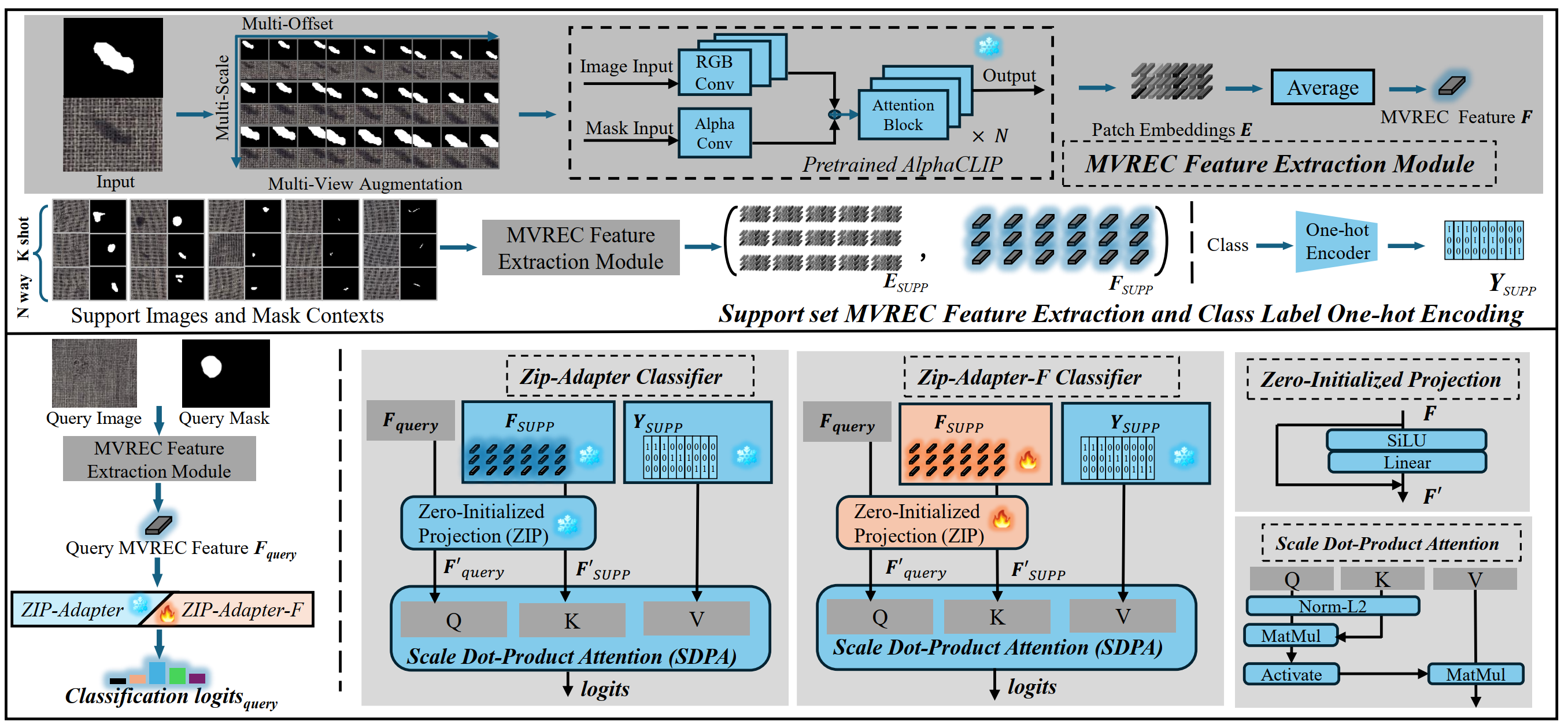This repository contains the implementation of MVREC, a general framework for Few-Shot Defect Multi-Classification (FSDMC), as described in our paper accepted to AAAI 2025.
Paper: https://arxiv.org/abs/2412.16897
Few-shot defect multi-classification is a critical problem in industrial quality control. Existing works predominantly focus on anomaly detection (localization), while MVREC is the first general few-shot defect classification framework based on the CLIP paradigm. MVREC addresses these challenges with the following innovations:
- General Features Extraction: Leveraging the pre-trained AlphaCLIP model for defect instance feature extraction.
- Region-Context Enhancement: A novel framework combining mask region input and multi-view context augmentation to refine defect features.
- Few-shot Zip-Adapter(-F) Classifiers: Efficiently cache visual features of the support set to enable few-shot classification.
- New Benchmark: Introduction of MVTec-FS, a few-shot defect dataset derived from MVTec AD, featuring 1228 images, 46 defect types, and instance-level mask annotations.
- Few-shot Support: Supports few-shot learning with k-shot configuration.
- Multi-View Contextual Learning: Incorporates multi-view augmentation to boost classification performance.
- Customizable: Configurable for different datasets and training scenarios.
The MVTec-FS dataset is based on MVTec AD and includes:
- 1228 defect images
- 46 defect types
- Instance-level mask annotations
For more details on MVTec-FS, refer to the paper.
You can download the MVTec-FS dataset from MVTec-FS GitHub repository. Once downloaded, update the data_param.py file to set the correct local paths to the dataset.
For more details on MVTec-FS, refer to the paper.
Install the dependencies:
pip install -r requirements.txtdata_param.py: Contains dataset configurations for MVTec-FS and other datasets.fewshot_process.py: Functions for generating few-shot support/query datasets and evaluation processes.param_space.py: Parameter configurations for experiments.run.py: Main entry point for training and evaluation.run.sh: Script for running experiments with different configurations.
Run the framework with:
python run.py --data_option mvtec_bottle_data \
--ClipModel.classifier EchoClassfierF \
--ClipModel.backbone_name ViT-L/14 \
--ClipModel.clip_name AlphaClip \
--debug.k_shot 5 \
--data.input_shape 224 \
--data.mv_method mso \
--debug.acti_beta 1 \
--exp_name experiment_name \
--run_name run_nameAlternatively, use the provided shell script:
bash run.sh- Datasets: Defined in
data_param.py. Examples includemvtec_carpet_data,mvtec_bottle_data, etc. - Parameters: Adjust parameters in
param_space.pyfor different experiment settings.
If you use this repository or the MVTec-FS dataset, please cite our work:
@article{author2025mvrec,
title={MVREC: A General Framework for Few-Shot Defect Multi-Classification},
author={Your Name and Others},
journal={Proceedings of the AAAI Conference on Artificial Intelligence},
year={2025}
}This project is licensed under the MIT License.
We thank the contributors to the MVTec AD dataset and the creators of AlphaCLIP.
